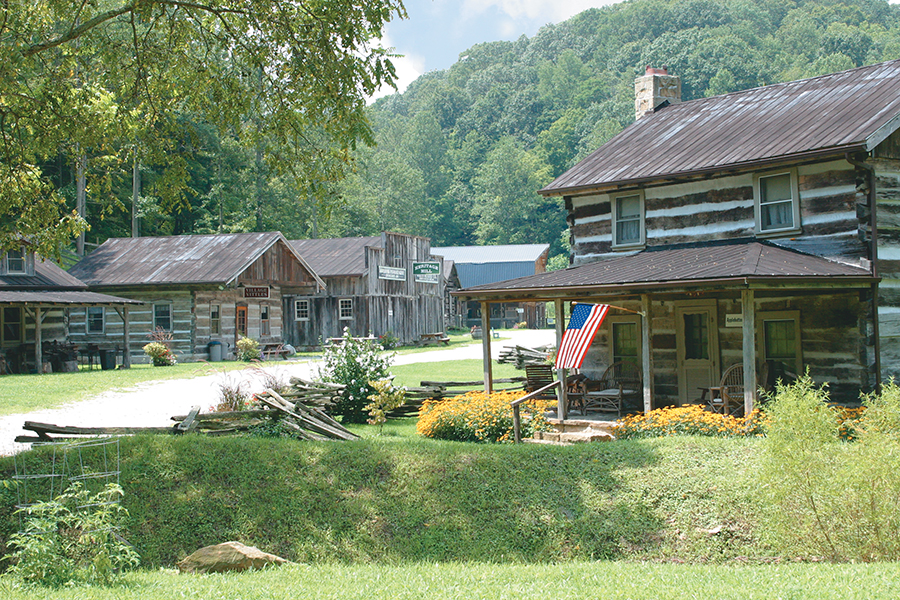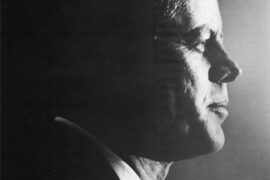Heritage Farm is one of Huntington’s best-kept secrets with everything from cozy bed and breakfast inns to spacious banquet facilities to suit your next social gathering.
By Marla Brannan
HQ 51 | SPRING 2004
According to Mike Perry, owner and operator of Huntington’s Heritage Farm Village and Museum, guaranteeing a lasting museum can be a challenge. So the retired attorney and banker, along with his wife Henriella, figured out a more secure source of revenue than just the price of admission – using the beautiful structures at Heritage Farm in an alternative fashion. In so doing, the Farm has become Huntington’s hidden hideaway. With four bed and breakfasts, it’s the perfect close-to-home romantic getaway or alternative to downtown lodging for out-of- town guests.
Located just two miles from Fifth Street hill on Harvey Road in Wayne County, Heritage Farm Village and Museum is a collection of more than 15 authentically outfitted buildings ranging from a one-room schoolhouse and general store to a blacksmith shop and sawmill. But what many people may not realize is that four antiques-filled homes, the church, the Welcome Center and Heritage Hall are all available for rent at extremely reasonable rates. The bed and breakfasts (Strawberry, Hollyberry, Blackberry and Apple Butter Inns) look and feel rustic with log walls, period pieces and wood burning fireplaces, but are actually fully modern with kitchens, heating and air conditioning, laundry facilities and a pool. As Mr. Perry says, “The Farm merges our extraordinary heritage with the beauty and conveniences of our modern society – atmosphere and convenience – six blocks from the city limits.”

Heritage Farm grew out of Mike and Henriella’s desire to not just preserve our Appalachian heritage, but to show the world (and ourselves) that it is something of which to be proud. “One of our challenges in West Virginia is that people have either quit dreaming or they have low self-esteem, and I’ve become convinced that no one outside the state will think more highly of us than we think of ourselves. We think that when people come through the Museum they’ll see their ancestors in a different light. The story that’s never been told is the wonderful story of those who came down the rivers and over the mountains and created this marvelous quality of life. They got lost between the settlement of the East Coast and the western movement. What about them? The ‘good old days’ weren’t so good – but the people were! We should be immensely proud of our Appalachian heritage. These people were ingenious in the variety of ways they could live off the land and were as self-reliant as any group of people I’ve identified in this country since our Native Americans. Give me two hours at the Museum and people, whether from Appalachia or not, can’t help but leave with an appreciation of these people and who we are and why we have every right to be proud. That’s why we’re delighted to have people from all over visit.”

This is the Museum’s philosophy: Study the past. Gain an appreciation of the present. Think about and plan for the future. It isn’t about simple nostalgia; it’s about noticing how those Appalachian pioneers welcomed and bested change. And, it’s about how we could learn a valuable lesson from them. Mike and Henriella think this lesson is important enough that they’re spending their retirement years pursuing it.
“I’m so proud of my wife,” Mike says. “Here we are in retirement and she has a full time job! Her day starts feeding the animals, and she runs the Museum and takes care of arrangements for people who want to use our facilities.
Lots of people are taking cruises and traveling and playing golf. But this is what we enjoy and what we think is important. We don’t want to have spent this much time and energy for something that will have to be dismantled when we’re gone.”

Growing out of that desire was the need to find a way of securing the future so schoolchildren and grandparents alike can continue discovering the ingenuity, industriousness and perseverance of their ancestors. At first only the church and Apple Butter Inn were used for small parties and weddings. Mike decided to focus on activities that would bring people to Heritage Farm and make it well-known as more than a wonderful museum. He certainly succeeded. “Now we have four large homes available for bed and breakfasts, a church which now has beautiful pews making it more suitable for weddings, a Welcome Center which can seat 80-90 for dinner, and the recently completed Heritage Hall that can seat 150 for dinner. This makes it possible to deal with events like high school or family reunions with people coming in from various parts of the country.” And don’t worry about the kids. With a petting zoo and hay rides available there’s plenty to keep them busy. In fact, one concern the Perry’s often hear is parents’ fear that their kids will be bored. It’s rarely a problem.

“I’m hoping these facilities will catch on and help subsidize the museum so school-children can keep enjoying this place. We’re not going to compete with the Radisson and large downtown weddings with receptions at the Guyan Country Club. I just want this place to maintain itself and stand once I’m gone.”

So if you want a peaceful, convenient and affordable alternative for your romantic getaway, wedding, reunion, party, strategic planning meeting, Thanksgiving or Christmas dinner, out-of-town guest lodging or children’s birthday party (or anything else you might dream up), consider Heritage Farm Village and Museum. You’ll find the tranquility and simplicity an inspiration for your daily life. As Mike affirms, “The whole purpose is to slow down, unwind, talk to each other, play games, take a walk, get things back in perspective. Let’s figure things out and remember what’s important. Let’s not get stuck in the past or the present – let’s look toward the future.”

Heritage Farm Village and Museum won the National Society Daughters of the American Revolution Medal for Historic Preservation. For information about facilities and prices, log onto heritagefarmmuseum.com or call 304-522-1244.





